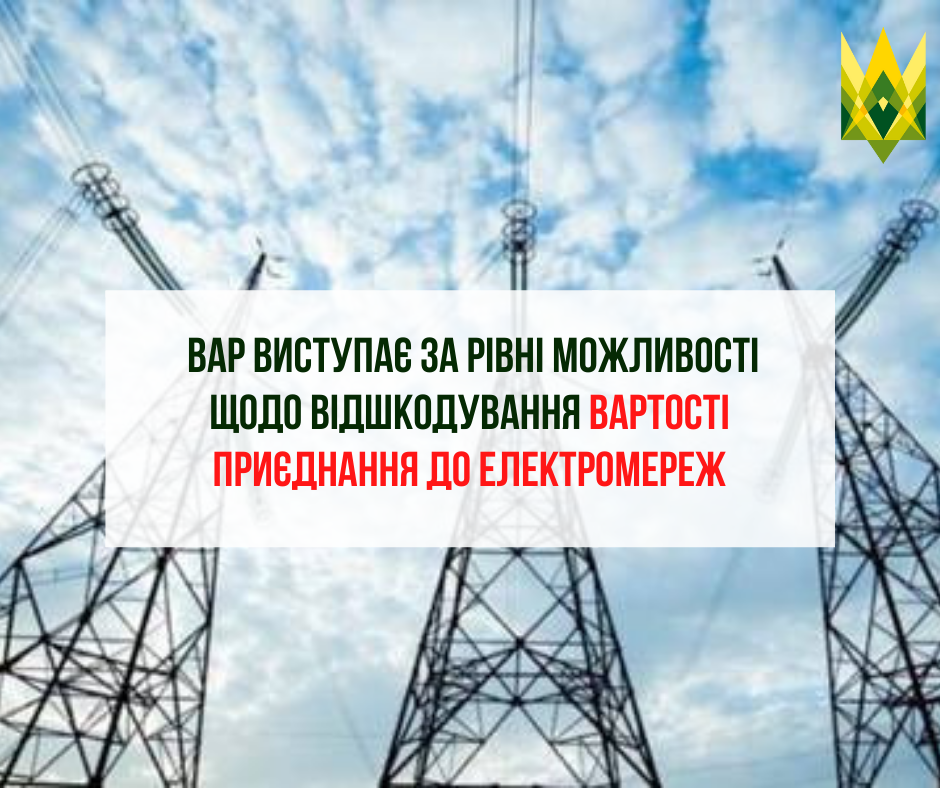
The issue of simplifying the connection of enterprises to the power grids is on the agenda of the UAC. Last year, a number of changes took place in this direction, including participation of the UAC, however, there are still many issues that need to be solved.
In particular, some of the amendments of an advisory center “Smart Country” were not included in the Law of Ukraine “On Amendments to Certain Legislative Acts of Ukraine Concerning Simplification of Connection to Power Grids”. However, given their importance in settling relations with distribution system operators (DSO), the center’s experts propose to include them in the draft law "On Amendments to Certain Laws of Ukraine (on Regulation of Security of Electricity and Natural Gas Supply)" published by the Ministry of Energy of Ukraine in December 2021 for discussion.
Among the proposals of the UAC is to restore for all enterprises the right to a refund of money paid for the connection service (linear part) to distribution system operators (DSO), if such DSO switched to the incentive tariff (this right was abolished by the Law of Ukraine "On Amendments to Certain Legislative Acts of Ukraine on Simplification of Connection to Power Grids" for those enterprises that paid for the service before the transition of the DSO to the incentive tariff)
Acts of Ukraine on Simplification of Connection to Electric Networks” for those enterprises that paid for the service before the transition of the SRF to the incentive tariff).
An expert from the “Smart Country” Roman Fedorchenko explains that the principles of such stimulating tariffs were written in the Laws of Ukraine “On the Electricity Market” and “On Natural Monopolies”. Its essence is that conditions were created for distribution system operators (DSOs) under which they could attract investments for the development of power grids. Thus, tariffs for each DSO were calculated depending on the number of its assets.
"However, when evaluating such assets, the list includes grids that were created not by investment programs, but by individual order. That means, companies that wanted to connect to the grid ordered a connection service from the regional power company, for which they paid separately. Thus, power grids were formed at neighborhoods, factories and agricultural enterprises. Accordingly, the Law of Ukraine “On the Electricity Market” provided that the funds received by distribution system operators as payment for connection to the creation (construction) of electrical grids of the linear part of the connection were a subject to be returned to the customer of such a connection. There was only one condition - such assets, after the transition of the distribution system operator to the incentive regulation, had to be registered in the base of assets. However, the sudden changes from the deputies, introduced in the Law of Ukraine №1657-IX, such an opportunity - to get money for the linear component - was lost," Roman Fedorchenko explained.
In addition, there is currently no register of such substations that shows an objective picture of their number and value - no one has authorized the DSO to establish such registers in their regions.
That is why the UAC proposes to restore the right of customers to connect to the grid to receive funds paid by them as payment for connection to the creation (construction) of electrical grids of the linear part of the connection, if such funds, before the transition to incentive regulation, DSO assets (networks, substations) were created and included in the regulatory asset base. It is also proposed to oblige the DSOs to provide the Regulator with a report listing such assets.
Among the UAC’s items:
- to exclude from the powers of the State Energy Supervision Authority control over the commissioning of low-power power plants using solar, wind and biomass energy, with a capacity of up to 150 kW. Such power plants are often installed to compensate for their own consumption (eg "solar" power plants in private households or on the roofs of commercial buildings), due to low capacity and energy consumption at the place of its production (for own energy needs), the participation of such power plants is minimal. the number of "small" (distributed) generations is constantly growing, so control over them will require significant resources, and the effect of such control is difficult to be predicted.
- to increase fines from 10,000 to 150,000 non-taxable minimal incomes for businesses operating in the licensed electricity market. The proposal is made due to the need to strengthen the responsibility of market participants in view of the lack of motivation of market participants to prevent violations.